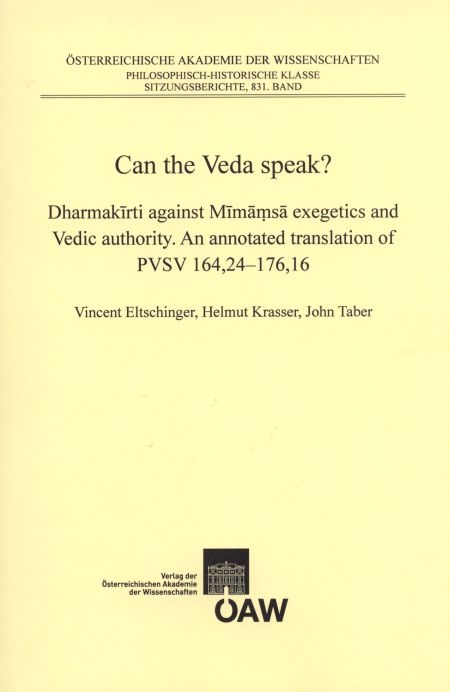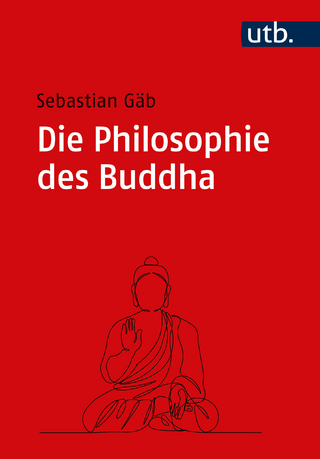
Can the Veda speak?
Dharmakirti against Mimamsa Exegetics and Vedic authority. An Annotated Translation of PVSV 164,24–176,16.
Seiten
2012
Verlag der österreichischen Akademie der Wissenschaften
978-3-7001-7129-4 (ISBN)
Verlag der österreichischen Akademie der Wissenschaften
978-3-7001-7129-4 (ISBN)
- Titel nicht im Sortiment
- Artikel merken
The present volume provides an annotated English translation of the last section of Dharmakirti’s Prama?avarttikasvav?tti (PVSV 164,24–176,16, ad stanzas 1.312–340), which includes his final assault on the Mima?sa doctrine of the authorlessness (apauru?eyatva) of the Veda. Dharmakirti draws out the apparently fatal consequences of this doctrine: If the Vedic scriptures are without an author, hence without an underlying intention, they can only be meaningless. Even if they have a meaning, it must be supersensible. But then, claiming that the leading Mima?saka authorities – Jaimini, Sabara – possessed privileged cognitive access to its supersensible meaning is not an option, since the Mima?saka denies that humans have any supernatural form of knowledge. In short, Dharmakirti forces his opponent to admit that the Veda is nothing but a mutus liber, a “mute book.” Besides questioning the very possibility of Vedic hermeneutics under Mima?saka presuppositions, the passage translated contains interesting allusions to Dharmakirti’s linguistic theory, his views on scriptural authority, his critique of the Veda’s reliability, and his understanding of the transmission of the Veda and Vedic sakhas (“schools”, “recensions”). The section includes Dharmakirti’s polemics against a mysterious v?ddhamima?saka (“ancient Mima?saka”).
An introduction (pp. 7–21: “The Place of PVSV 164,24–176,16 in the work of Dharmakirti,” by V. Eltschinger), a synopsis of contents (pp. 23–30) and two independent essays round off the volume. H. Krasser’s “Logic in a Religious Context: Dharmakirti in Defence of agama” (pp. 83–118) sheds new light on Dharmakirti’s conception of scriptural authority and its indebtedness to Dignaga. J. Taber’s “Dharmakirti and the Mima?sakas in Conflict” (pp. 119–149) explores the guiding principles of the Mima?sa system of exegesis and assesses the relevance of Dharmakirti’s arguments against it. A general bibliography and various indices complete the volume.
An introduction (pp. 7–21: “The Place of PVSV 164,24–176,16 in the work of Dharmakirti,” by V. Eltschinger), a synopsis of contents (pp. 23–30) and two independent essays round off the volume. H. Krasser’s “Logic in a Religious Context: Dharmakirti in Defence of agama” (pp. 83–118) sheds new light on Dharmakirti’s conception of scriptural authority and its indebtedness to Dignaga. J. Taber’s “Dharmakirti and the Mima?sakas in Conflict” (pp. 119–149) explores the guiding principles of the Mima?sa system of exegesis and assesses the relevance of Dharmakirti’s arguments against it. A general bibliography and various indices complete the volume.
| Erscheint lt. Verlag | 11.9.2012 |
|---|---|
| Reihe/Serie | Beiträge zur Kultur- und Geistesgeschichte Asiens ; 74 | Sitzungsberichte der philosophisch-historischen Klasse ; 831 |
| Mitarbeit |
Herausgeber (Serie): Helmut Krasser |
| Verlagsort | Wien |
| Sprache | englisch |
| Maße | 150 x 240 mm |
| Gewicht | 298 g |
| Einbandart | Paperback |
| Themenwelt | Geisteswissenschaften ► Philosophie ► Östliche Philosophie |
| Geisteswissenschaften ► Religion / Theologie ► Hinduismus | |
| Geisteswissenschaften ► Sprach- / Literaturwissenschaft ► Literaturwissenschaft | |
| Schlagworte | Can the Veda speak? • Dharmakirti • Mimamsa • Philosophie • Veda |
| ISBN-10 | 3-7001-7129-3 / 3700171293 |
| ISBN-13 | 978-3-7001-7129-4 / 9783700171294 |
| Zustand | Neuware |
| Haben Sie eine Frage zum Produkt? |
Mehr entdecken
aus dem Bereich
aus dem Bereich
Eine Auswahl. [Was bedeutet das alles?]
Buch | Softcover (2021)
Reclam, Philipp (Verlag)
6,00 €


